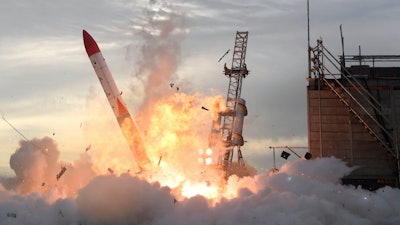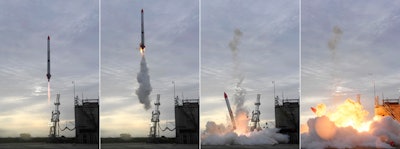
TOKYO (AP) — A rocket developed by a Japanese startup company burst into flames seconds after a failed liftoff Saturday in northern Japan.
The MOMO-2 rocket, developed by Interstellar Technologies, was launched in Taiki town on Hokkaido, Japan's northernmost main island. It was supposed to reach as high as 100 kilometers (62 miles) into space.
Television footage showed that the 10-meter (33-foot) pencil rocket lifted only slightly from its launch pad before dropping to the ground, disappearing in a fireball. Footage on NHK public television showed a charred rocket lying on the ground.
 This combination of photos shows the launch of a Japan's privately developed rocket, MOMO-2, from left to right, fails in Taiki, northern island of Hokkaido, Japan, Saturday, June 30, 2018. According to Kyodo News, the launch failed Saturday, as the rocket crashed to the ground and burst into flames seconds after liftoff, its developer said.Masanori Takei/Kyodo News via AP
This combination of photos shows the launch of a Japan's privately developed rocket, MOMO-2, from left to right, fails in Taiki, northern island of Hokkaido, Japan, Saturday, June 30, 2018. According to Kyodo News, the launch failed Saturday, as the rocket crashed to the ground and burst into flames seconds after liftoff, its developer said.Masanori Takei/Kyodo News via AP
The incident caused no injuries.
Interstellar Technologies president Takahiro Inagawa said he believes the rocket suffered a glitch in its main engine.
He apologized for the failure, and said his team would collect the debris to analyze the problem and improve the rocket.
Saturday's failure was the second after the rocket's first launch last July.
The project was started in 2005 by maverick entrepreneur Takafumi Horie, founder of internet service provider Livedoor, who was joined by science journalists and other space fans in an effort to develop a small, lightweight and low-cost rocket to send information satellites into space.






















